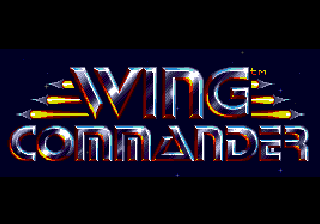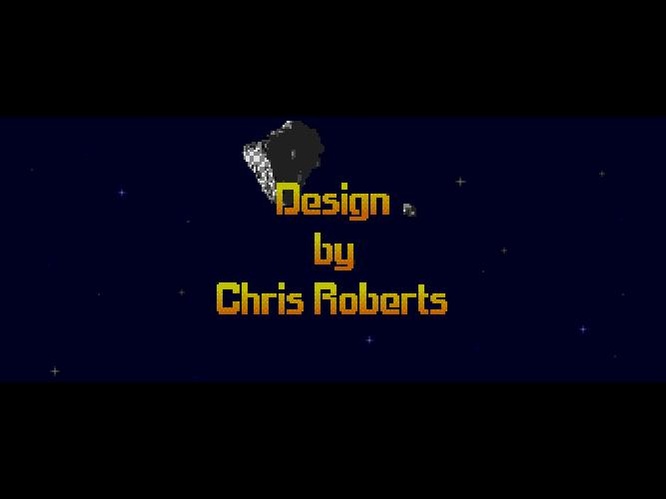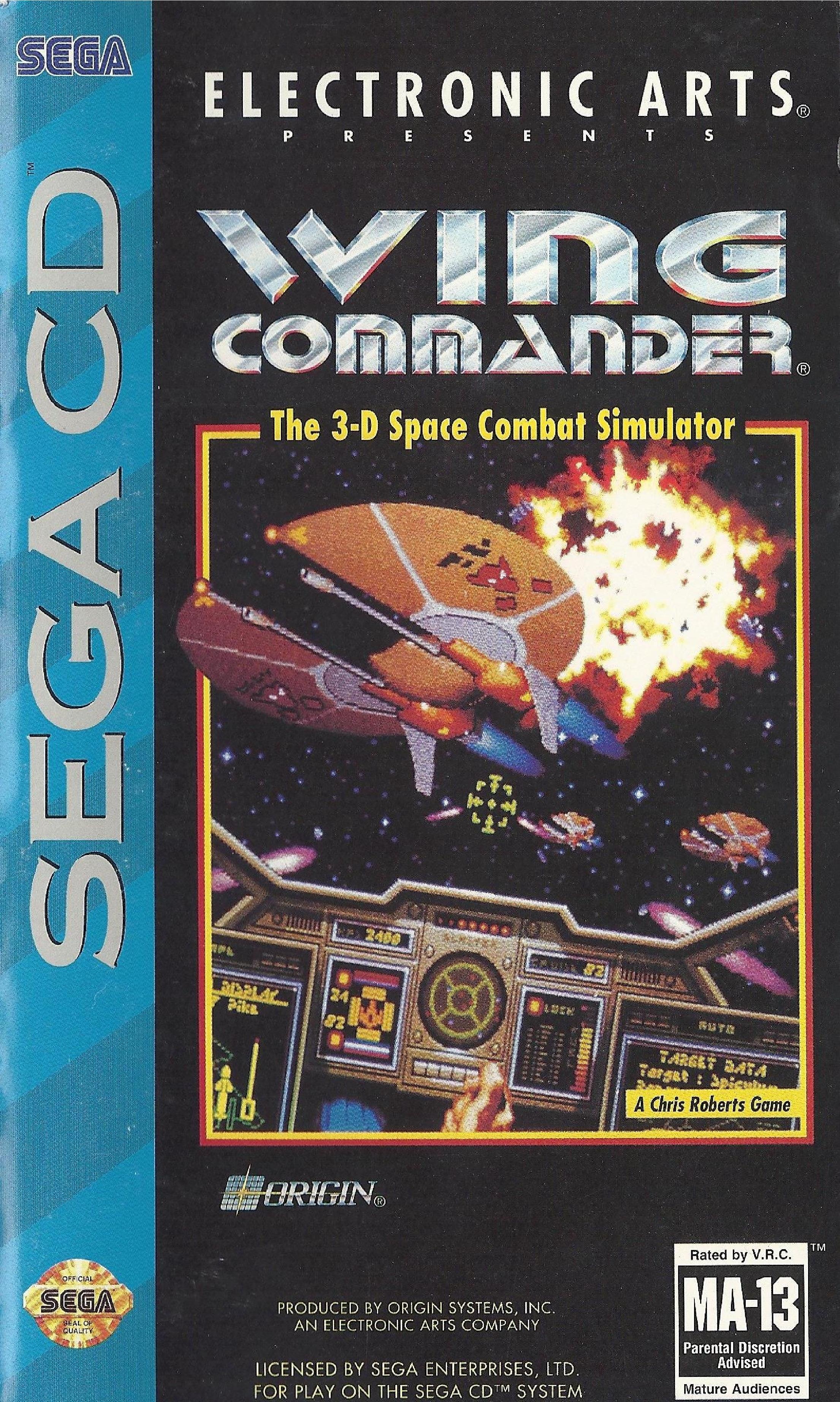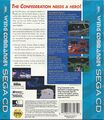Difference between revisions of "Wing Commander"
From Sega Retro
ThunderHawk (talk | contribs) |
ThunderHawk (talk | contribs) m |
||
| Line 37: | Line 37: | ||
Players could get promoted and receive medals for outstanding performance, even though these rewards have no effect on gameplay. | Players could get promoted and receive medals for outstanding performance, even though these rewards have no effect on gameplay. | ||
| − | Players start the mission with pre determined planes and loadout but this was changed starting Wing Commander III, which | + | Players start the mission with pre determined planes and loadout but this was changed starting Wing Commander III, which allowed players to fly with the planes and weapons of their choosing. |
==Versions== | ==Versions== | ||
| Line 55: | Line 55: | ||
A huge success, multiple ports and sequels were released over the course of 90s. Franchise also included a cartoon series, several novels and a rather not-well-recieved cinematic movie. | A huge success, multiple ports and sequels were released over the course of 90s. Franchise also included a cartoon series, several novels and a rather not-well-recieved cinematic movie. | ||
| − | Wing Commander was not without its faults however. Several missions in the game were criticized for being extremely difficult to complete by regular players. These missions are usually escort missions as enemy AI is designed to attack defensive targets without delay (even when enemy pilots are under heavy attack). One certain mission in Kurosawa sector (the infamous "Defend the Ralthi" mission) is, even this day, is considered almost impossible to complete. (To be fair, losing that mission does not necessarily put players in losing path, as it is | + | Wing Commander was not without its faults however. Several missions in the game were criticized for being extremely difficult to complete by regular players. These missions are usually escort missions as enemy AI is designed to attack defensive targets without delay (even when enemy pilots are under heavy attack). One certain mission in Kurosawa sector (the infamous "Defend the Ralthi" mission) is, even to this day, is considered almost impossible to complete. (To be fair, losing that mission does not necessarily put players in losing path, as it is possible to return to the winning path after completing the Rostov sector, which contains much easier missions) |
==Production credits== | ==Production credits== | ||
Revision as of 06:42, 9 September 2023
| Wing Commander | |||||||||||||||
|---|---|---|---|---|---|---|---|---|---|---|---|---|---|---|---|
| System(s): Sega Mega-CD | |||||||||||||||
| Publisher: Electronic Arts (US)
Sega (JP) | |||||||||||||||
| Developer: Origin Systems Game Arts, Bits Laboratory, CRI | |||||||||||||||
| Original system(s): PC | |||||||||||||||
| Peripherals supported: CD BackUp RAM Cart | |||||||||||||||
| Genre: Simulation[1][2] | |||||||||||||||
| Number of players: 1 | |||||||||||||||
| |||||||||||||||
|
This short article is in need of work. You can help Sega Retro by adding to it.
Wing Commander is a notable space combat flight game by Origin Systems for IBM PC compatibles. It was ported to a number of systems including the Sega Mega-CD in 1994.
The game was also reportedly in development for the Sega Mega Drive, with the cartridge containing an extra graphics chip for scaling and rotation.[5][6] This was cancelled in favour of the Mega-CD version.
Contents
Story and Premise
Story takes place in the year of 2654 in which Terran Confederation (a UN-like organization consists of human planets) is at war with Kilrathi, a bloodthirsty, warrior race which resembles large antromorphic cats.
Player character (nicknamed "Hotshot" in the Mega-CD version) is a young 2nd Lt in the Terran forces who must fight against the Kilrathi alongside the pilots of TCS Tiger's Claw.
Gameplay
Wing Commander plays in a sort of "Dynamic Campaign". Instead of a linear set of missions, which might end the game if mission is failed, game continues in different sectors depending on player's performance. It is possible to achieve different endings based on completion of particular missions in order. Game over is only possible if the player is destroyed during mission, ejects but captured by Kilrathi or reaches a campaign end in which Confederacy is defeated, which leads to bad ending.
Players could get promoted and receive medals for outstanding performance, even though these rewards have no effect on gameplay.
Players start the mission with pre determined planes and loadout but this was changed starting Wing Commander III, which allowed players to fly with the planes and weapons of their choosing.
Versions
Wing Commander was originally released in 1990 for the IBM PC, with the Mega-CD version debuting three years later. It is a relatively accurate conversion, with most of the content being retained, though some cinematics are missing scenes while others are simplified. The move to CD-ROM also means the characters could be fully voiced - a feature missing in most ports of the game, though in return, all subtitles were removed from the game for unknown reasons.
While the game provides CD quality audio for its introduction, the vast majority of the music tracks rely on standard Mega Drive audio capabilities. Sound effects too are mostly driven by the Mega Drive, as are curiously in-game voices, resulting in much lower quality audio during play.
All of the art assets were altered to better suit the screen resolution (320x224 vs 320x200) and more restricted colour palette of the Mega-CD (256 (VGA) vs 64 colours, although the PC version also supports 16 colour EGA cards). Cinematics can also be briefly interrupted while data is loaded from the disc. While the game does not resort to dedicated loading screens, it can lead to unnatural pauses during conversations.
Wing Commander simulates its 3D world by heavy use of sprite rotation and scaling. On the Mega-CD, these sprites are often smaller, leading to blockier graphics when up close to an object than on the PC. The frame rate is also lower than some versions of the game, such as the Amiga CD32 conversion released some months later, however Wing Commander on the Mega-CD generally performs better than its standard Amiga and Super NES counterparts.
It should be noted, however, that a high level of performance running the original PC version requires a high-end Intel 80386 or an early 80486 processor (as if system is too modern, the game will run too fast). Most PC users at the game's launch were unlikely to have access to these then-expensive configurations, meaning performance of the Mega-CD version would have been typical of what many end users would have experienced in the early 1990s (and indeed of most "3D" games of the era).
Legacy
Wing Commander is considered a trail-blazer in terms of cinematic story telling and space combat simulator design. Many other space combat simulators often took Wing Commander as an example. Wing Commander, alongside Doom, are considered two games that allowed PC overtake Amiga in home computer race. (While there was an Amiga version of Wing Commander, it was nowhere as good as the PC version)
A huge success, multiple ports and sequels were released over the course of 90s. Franchise also included a cartoon series, several novels and a rather not-well-recieved cinematic movie.
Wing Commander was not without its faults however. Several missions in the game were criticized for being extremely difficult to complete by regular players. These missions are usually escort missions as enemy AI is designed to attack defensive targets without delay (even when enemy pilots are under heavy attack). One certain mission in Kurosawa sector (the infamous "Defend the Ralthi" mission) is, even to this day, is considered almost impossible to complete. (To be fair, losing that mission does not necessarily put players in losing path, as it is possible to return to the winning path after completing the Rostov sector, which contains much easier missions)
Production credits
- Design by: Chris Roberts
- Software Engineers: Chris Roberts, Ken Demarest III, Paul C.Isaac, Steve Muchow, Herman Miller, Steve Beeman
- Dogfight Intelligence: Ken Demarest III
- Dogfight Choregraphy: Steve Beeman, Erin Roberts
- Space System by: Chris Roberts
- OriginFX Graphic System: Chris Roberts, John Miles
- OriginFX Sound System by: Herman Miller
- Artwork: Denis Loubet, Glen Johnson, Daniel Bourbonnais, Keith Berdak, John Watson
- Screenplay by: Jeff George
- Additional Writing: Steve Cantrell, Philip Brodgen
- Soundtrack by: George A.Sanger, Dave Govett
- Sound Effects by: Marc Shaefgen
- Produced by: Chris Roberts, Warren Spector
- Directed by: Chris Roberts
- Origin: Chris Roberts, Steve Muchow, Paul C.Isaac, Steve Beeman, Ken Demarest III, Herman Miller, Erin Roberts, John Miles, Denis Loubet, Glen Johnson, Daniel Bourbonnais, Keith Berdak, John Watson, Jeff George, Steve Cantrell, Philip Brodgen, George A.Sanger, Dave Govett, Marc Shaefgen, Warren Spector
- Game Arts: Youichi Miyaji, Satoshi Uesaka, Horoaki Okabe, Takuya Osamura, Osamu Harada, Yuzo Sunaga, Masatoshi Azumi, Meiko Wada, Tadao Mizuno, Akiko Satou, Mitsuhiro Watariya, Hideki Kanai, Naoki Kudou, Ari Kamijou, Ken-ichi Kunishima, Takeshi Miyaji
- Bits Laboratory: Satoru Miyazaki, Motoyuki Kanayama
- CRI: Yasushi Hirasaki, Miwako Ohshima, Yukinori Kaneko, Akira Nagano, Takahiro Kanou, Masayoshi Hari, Tsunehisa Nakai
- Two-Five: Isao Mizoguchi, Noriyuki Iwadare, Ken-ichi Ookuma, Masaki Tanimoto
- All Talent Provided to Sega of America, inc., by: David Platshon, DMP Entertainment.
- Executive Producer: Kent Russel.
- Sega CD version developed by: Game Arts
- Producer: Alan Gardner
- Package Design: Al Carnley, Jeniffer Davis, Craig Miller
- Documentation Design: Jeniffer Davis
- Documentation and Editing: Tuesday Frase, David Ladyman
- Q.A. Project Leader: Alvaro Moreno
- Quality Assurance: Mark Franz
- Producers: Chris Roberts, Warren Spector
- Lead Programmer: Chris Roberts
- Programmers: Steve Beeman, Ken Demarest III, Paul Isaac, Herman Miller, Steve Muchow
- Dogfight Coreography: Steve Beeman, Erin Roberts
- 3-D Space System: Chris Roberts
- ORIGIN Graphic System: John Miles, Chris Roberts
- ORIGIN Sound System: Herman Miller
- Art: Keith Berdak, Daniel Bourbonnais, Glen Johnson, Denis Loubet, John Watson
- Writers: Philip Brogden, Steve Cantrell, Jeff George
- Music: Dave Govett, George A. Sanger
- Sound Effects: Marc Shaefgen
- Quality Assurance: Philip Brogden, Steve Cantrell, Greg Paul Malone II, Erin Roberts, Mike Romero, Marc Shaefgen, Jeff Shelton, Scott Shelton, Brian Tompkins, John Watson
Magazine articles
- Main article: Wing Commander/Magazine articles.
Physical scans
| Sega Retro Average | ||||||||||||||||||||||||||||||||||||||||||||||||||||||||||||||||
|---|---|---|---|---|---|---|---|---|---|---|---|---|---|---|---|---|---|---|---|---|---|---|---|---|---|---|---|---|---|---|---|---|---|---|---|---|---|---|---|---|---|---|---|---|---|---|---|---|---|---|---|---|---|---|---|---|---|---|---|---|---|---|---|---|
|
| 70 | |
|---|---|
| Based on 12 reviews | |
Technical information
- Main article: Wing Commander/Technical information.
References
- ↑ File:WingCommander MCD JP Box Back.jpg
- ↑ 2.0 2.1 https://sega.jp/history/hard/mega-cd/software.html (Wayback Machine: 2020-06-22 19:24)
- ↑ https://groups.google.com/g/rec.games.video.sega/c/rKWRkjF8YKk/m/C7AJOkDk2xAJ
- ↑ 4.0 4.1 Game Players, "Vol. 7 No. 7 July 1994" (US; 1994-0x-xx), page 88
- ↑ Computer & Video Games, "June 1994" (UK; 1994-05-15), page 14
- ↑ Sega Magazine, "May 1994" (UK; 1994-04-15), page 14
- ↑ File:WingCommander MCD JP SSCredits Intro.pdf
- ↑ File:Wingcommander mcd us manual.pdf, page 66
- ↑ Beep! MegaDrive, "April 1994" (JP; 1994-03-08), page 22
- ↑ Famitsu, "" (JP; 1994-03-18), page 1
- ↑ GamePro, "July 1994" (US; 1994-xx-xx), page 66
- ↑ Hippon Super, "April 1994" (JP; 1994-03-03), page 60
- ↑ MAN!AC, "05/94" (DE; 1994-04-13), page 52
- ↑ Mega, "September 1994" (UK; 1994-08-18), page 54
- ↑ Mega Fun, "06/94" (DE; 1994-05-18), page 104
- ↑ MegaTech, "September 1994" (UK; 1994-08-18), page 28
- ↑ Sega Pro, "June 1994" (UK; 1994-05-24), page 56
- ↑ Sega Saturn Magazine, "September 1995" (JP; 1995-08-08), page 85
- ↑ Video Games, "6/94" (DE; 1994-05-25), page 87
| Wing Commander | |
|---|---|
|
Main page | Comparisons | Magazine articles | Reception | Technical information | |
| Wing Commander games for Sega systems |
|---|
| Wing Commander (1994) | Wing Commander II: Vengeance of the Kilrathi (unreleased) | Wing Commander III: Heart of the Tiger (unreleased) | Wing Commander IV: The Price of Freedom (unreleased) |
- CD BackUp RAM Cart-compatible games
- 1 player games
- JP Mega-CD games
- All JP games
- US Mega-CD games
- All US games
- Mega-CD games
- 1994 Mega-CD games
- All 1994 games
- Mega-CD simulation games
- All simulation games
- All games
- Stubs
- Credits without reference
- Wing Commander
- Wing Commander (franchise)
- Unreleased Mega Drive games
- Six Button Control Pad-compatible games









